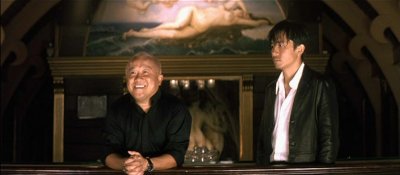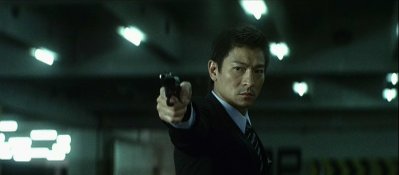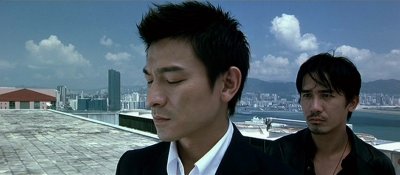Infernal Affairs
Traitors, traitors everywhere. This Hong Kong blockbuster shows us how Cop dramas should be done.

No, that isn't a typo. This odd spelling of the title is both a play on the more obvious police department title and a somewhat tortuous reference to eternal hell. This movie was nominated for a ridiculously large sixteen Hong Kong Film Awards, and frankly they are all very well deserved. Superficially a novel twist on the police vs. Triad genre, yet at heart a rather more complex morality tale concerned with defining your own identity, directors Andrew Lau and Alan Mak have produced a powerful movie which breathes new life into a genre in danger of being cliched and boring.
The premise of an undercover cop being sent to infiltrate a gang is just about as old as the hills. A touch less aged is the premise of sending a gang member to infiltrate the police force, and it's this that gives Infernal Affairs it's unique edge. Mob boss Sam (Eric Tsang) sends six of his newest and youngest members, the least known to the local police force, into police academy. Thankfully, Hong Kong police academy teaches people to be effective policemen rather than total clowns as Lassard's Police Academy does. Although seven are sent in, the story follows Ming (Andy Lau, thankfully not The Meciless) and his rise in the police force. While there, he witnesses Yan (Tony Leung) being expelled from academy, which is only a pretext for him to start his undercover career in the Triads. A brief montage show both their lives progressing, stopping ten years later.
Through a meeting with the police Superintendent Wong (Anthony Wong), we find that Yan has been undercover for seven years more than he was supposed to, and it's taking it's toll on his character. He's been arrested many time for assault and the like, leading to the usual soul-searching questions of whether he's more gangster than cop. Wong is the only man in Hong Kong who knows the true identity of Yan. The moment this is uttered you should be able to see the sword of Damocles hovering above him. Ming, aided by the inside information given to him by Sam, has risen quickly and risen far in the ranks of the police force, now being head of the CIB, sorta the HK equivalent of the CID. Between this, moving into his shiny new apartment and his impending marriage to a lovely young writer (who handily is writing a novel about someone with multiple personalities; a good man who has done bad things, in one of the most shoe-horned metaphors I've seen) Ming is having difficulty reconciling his status as mob informer with his all-round good guy image presented to everyone else.
This situation is brought to a head after an operation is set up to capture Sam and his merry gang of goons during a drug deal. Wong is aided by Yan's infiltration of the gang, while Ming is desperately trying to find ways to warn Sam without drawing attention to himself. It ends in a no-score draw of sorts, Sam losing the gear but Wong not having any evidence to make an arrest. It becomes apparent to both sides that they are employing someone who is batting for the other team, to abuse a phrase, and set in place investigations to find the traitors. Irony strikes a thumping blow when Ming is promoted to Internal Affairs and given the job of investigating, well, himself.

From Ming's point of view, it would be counterproductive to pretend to look for moles in the police department when he can use the time to find the mole in Sam's gang. He orders Wong followed, and duly is able to tip off Sam's gang to the next meeting of Wong and Yan. These events lead to a spiral of vengeance, with Yan trying to find and take down the mole in the police force while Ming realises that he has no wish to be a gangster any more, and tries to find a way to achieves this without being rumbled.
Events mushroom quickly to a rooftop showdown, which seem to be enjoying a well-deserved resurgence since Vanilla Sky, and the ending is as unpredictable as it is powerful. Perhaps unpredictable isn't exactly the correct term, there are only a few ways the ending could occur given the set-up, but it didn't go down the route I was expecting, prompting a few questions about the morality of it, and that of the characters.
It's precisely this that makes it a superior film to the many others of its kind. Not only does it have more original ideas, and implements them better than the rest, it actually raises a few questions while it does it. How much does a man's actions define his character when they were taken with ulterior motives? Are the superficial fronts the characters present to the world and are judged on more real than the characters underneath it?
Of course, all this would be meaningless if we don't care about the characters, but thankfully that is never an issue. The cast list for this movie reads like a Who's Who guide to the best actors working in Hong Kong at the moment, and none of them disappoint. From the slightly tortured performance from Leung as Yan, to Lau's more suave portrayal of Ming, and even the more clean cut roles of Wong and Tsang, and even the bit-part goons all are superbly acted. The only weakness in the film is the female leads, but that stems more from underwriting of their roles than lack of ability on their parts.
Given the cityscape of Hong Kong, it's difficult to create a dull-looking film there, and this is no exception. Using a few rooftop scenes in the movie is a wise idea, as the vistas it provides are breathtaking. Even the offices used are nicely done, although kitted out with more than their fair share of prominently placed Sony equipment. Clearly the product placement bug has been transmitted to the East, possibly from Bond's last outing there in Die Another Day. Indeed, the opening credits and title theme have a very Bondian ring to them, so maybe I've stumbled on something here. The truth is out there.
It's perhaps this that started me thinking that this is the most obviously Hollywood influenced HK flick I've seen, but on further reflection I'm not sure if that isn't because Hollywood has so heavily co-opted the HK style of film making in it's action extravaganzas over the years. I think I may have to go on a John Woo refresher course before coming to a definite conclusion, but with jump-cutting and fade to blacks, this is probably the most accessible Eastern movie I've seen for those accustomed to American films.

Don't make the mistake of thinking this is a heavily gun based movie in the 'heroic bloodshed' style of Woo, its 12A/15-ish equivalent rating belies that. Although the few action scenes are well done, the meat of this movie is in the characterisation of the leads and the strong narrative of the hunting of the moles in the respective organisations. The killing is kept to a minimum, and that which does occur is necessary to the plot and is of real consequence.
My only minor gripe is the film's ending, which while in no way disappointing wasn't how I was hoping it would turn out. A selfish reason for finding fault perhaps, but I'm an exceptionally selfish person. I've no doubt most impartial observers will prefer the less conventional ending here, but I'm an exceptionally conventional person. Nonetheless, Infernal Affairs remains an exceptionally strong example in it's field, and an exceptionally strong film period. What with this and Narc, we're being somewhat spoiled with good cop films lately. Hopefully it will continue, perhaps with the green-lighted Warner Brothers remake of this with Brad Pitt and Ben Affleck lined up as leads.
Were I in the business of passing quantifiable judgements, I'd award this 4/5 TippyMarks.
Alan Mak
Tony Leung Chiu Wai (Yan)
Eric Tsang (Sam)
Anthony Wong Chau-Sang (Superintendent Wong)